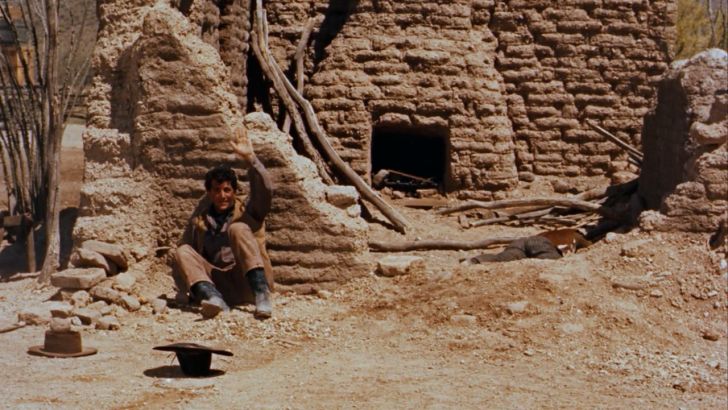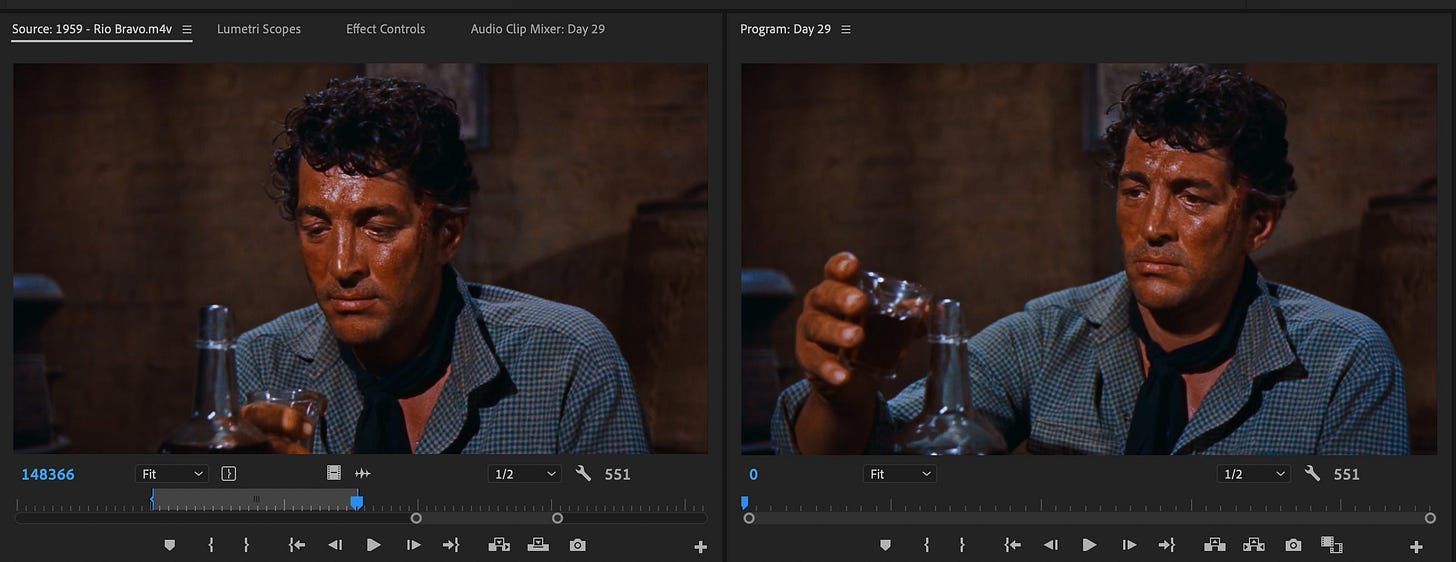November 1, 2021 was probably the most significant day in my work as a video essayist to date. It was Day 365 of “Rio Bravo Diary,” or the final day of my journey watching Howard Hawks’ Rio Bravo over the course of one year.
I’m feeling a lot of things now that the diary is finished. Namely, I can’t believe it’s over and that it has been one year. I’m sad, but I’m also relieved and happy to have finished. It’s nice having one less thing to do each day.
I’d also like to extend a big thank you to everyone who followed along, responded to my tweets and/or engaged with the project in some way. Sharing this journey with others was without question the best part. Imagine how boring it would have been if I had just done this in a Word Doc or something!
I’m still processing and taking some time to sit with the project. Eventually, I would like to write about it at length, either in an academic or non-academic context (perhaps both?). And of course maybe try and talk about it elsewhere and/or on The Video Essay Podcast at some point. If anyone has any thoughts or suggestions please let me know!
I do firmly believe that the project and its myriad forms, namely the video “adaptations” of the diary, are videographic criticism. I suppose for some it suffices to say that because I am a video essayist, and came to the project with that tradition and background in mind, that it is videographic criticism. But it’s my hope to tease out that idea much further, and think about the project in relation to a whole bunch of things, including spectatorship, cinephilia, digital media, etc.
But for the time being, I am going to continue focusing on making videographic adaptations of the diary and playing around with what has come from the last year.
I’m very pleased to share my fourth adaptation, “Rio Bravo 365.” This video collects the first frames of Days 1 - 365 of “Rio Bravo Diary.” As I wrote about recently, the process of creating the clips for the project was very simple. Each time I went into my Premiere file to create a new clip, I simply adjusted the end of the previous day’s clip by +550 frames and created a new one. I thus arrived at a somewhat randomly generated frame on which one clip ended and the next one began.
And so, I would often be presented with a still image like so:
These still images stuck with me. Sometimes I would tweet them, and many found their way into a folder on my computer. The video is a montage of these images, and is in a sense a recreation of the manual process of clipping the film each day and what I would see before annotating the film.
The diary itself is a deconstruction of Hawks’ film. Rio Bravo now exists in roughly 365 equal parts on Twitter, as a Tumblr feed, and a collection of clips on Critical Commons.
This video takes that deconstruction and reassembles it into a linear montage that shows how and where the film was “broken.” It is simultaneously a recreation of the project and an archive of my process.
I’ll have more to say on this in the future, but for now, as always, please let me know what you think!
Support the Show on Patreon
Please consider supporting this newsletter, the podcasts, and the other work I do on Patreon! Subscribers now get exclusive access to “video essay guides” to certain topics every other Monday. The most recent guide is “Rear Window: A Videographic Introduction.” Learn more and support the show here.
The latest guide will be posted tomorrow!
News & Notes
Please send news and notes for future newsletters to willdigravio@gmail.com
November
Kevin B. Lee shared a call for applications for a Post-Doc position now open for the Locarno Film Festival Future of Cinema and Audiovisual Arts program at Università della Svizzera italiana. The deadline is November 30. More here.
December
The “New Creative Praxis in Film & TV: Hybrid Futures of Gender Equality” online conference at Istanbul Bilgi University is now accepting submissions, and is especially interested in video essays and practice research. The deadline is December 1. More here. (h/t Katie Bird)
January
CFP: “Two forthcoming volumes of the journal Interfaces, available on OpenEdition, will bring together written articles and video essays that explore the ways in which the production, circulation and reception of images today involves ‘rescaling’ the visible, and, by extension, our experience of the visible, in increasingly radical ways.” The deadline for abstracts is January 10, 2022. More here.
February
Screenworks has a new call for practice for a new special issue on “Musicology on Screen” edited by Estrella Sendra, Barley Norton and Joseph Owen Jackson. The deadline for proposals is February 1, 2022. Learn more here.
More Notes (New)
The latest issue of [in]Transition is here! Watch and read here.
A thread all interested in video essays should read from Thomas Flight. The thread concerns copyright, HBO, YouTube, and Thomas’ recent video essay on Dune (2021). Read here.
“The Essay Library Anthology, Vol. 3: Death” is now here! The project is a compilation of 60-second micro-essays from 18 creators each exploring the theme of “death” from a different angle. More here.
Nelson Carvajal chatted with Ava DuVernay about the essay film genre and how its used in her latest work, Colin in Black and White. Watch a clip here.

More Notes (Cont.)
Johannes Binotto has made available lectures and videos from a recent video essay workshop at Charles University entitled, “Minor Instances, Major Consequences.” Watch and read here.
Steve Macfarlane has assembled a great Twitter thread of various film catalogues in PDF form from the 70s, 80s, and 90s. You can find the thread here. (h/t Catherine Grant)
Zia Anger has started performing My First Film live and in person again. Follow Zia on Twitter for more information about shows.
Adrian Martin and Cristina Álvarez López have released the second episode of their “Multimedia Lectures On Film” series. This one centers on La Captive (Chantal Akerman, 2000). Watch here.
I may have shared links to these resources before, but Ariel Avissar recently shared them again so here they are again! Ian Garwood put together collections of discussions and videos on videographic criticism. Here is a collection of videos on YouTube. And another for videos on Vimeo.
Preview to Episode 29. Thomas Flight
The next episode of The Video Essay Podcast will feature a conversation with Thomas Flight. On the show, Thomas and I discuss a wide range of topics, including two videos in great detail: “The Side of Scorsese We Don’t Talk About” and Jacob Geller’s “The Game That Won’t Let You See All of It.” Watch both below.





